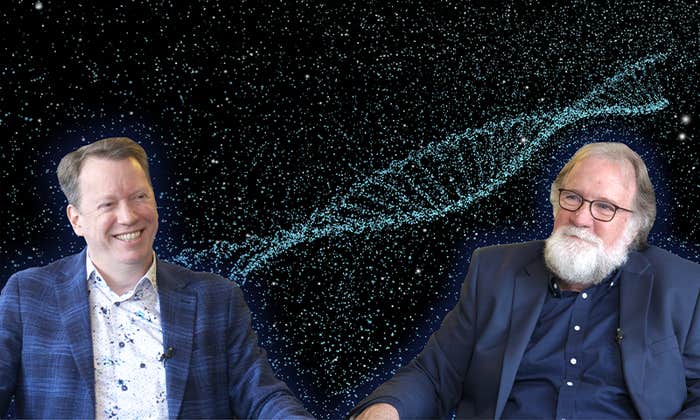The year was 1986. It was my first week at my first real job in science after finishing undergraduate work. I just had recently been hired as a scientific programmer at NASA’s Goddard Institute for Space Sciences (GISS) in upper Manhattan, and was still so new that I wasn’t sure where the bathrooms were. Earlier that day my boss told me there was a thing called a “seminar” happening at 4 pm and I should go. It would be interesting, she told me.
I showed up at 3:45 to find an empty conference room. Finding a corner to hide in, I sat down and waited. After a minute or so a short guy wandered in. He looked more than a bit disheveled in a white ill-fitting, short-sleeve button-down fronting a more than noticeable blueberry pie stain near the pocket. I am ashamed to say that my first thought was, “Whoa. What a mess. Who is this dude?”
Soon other members of the GISS staff came warmly greeting Mr. Blueberry Stain and helping him get set up at the overhead projector. That was when it dawned on me: This guy was the speaker.
What followed was a beautifully lucid explanation of atmospheric fluid dynamics and the role its plays in, what was then, state-of-the-art climate models. I learned things that day about fluid flow that I still use in my studies of astrophysical gas dynamics. More importantly I learned two important lessons about a life in science.
The first lesson was it’s not about how you look. The mostly unlikely people can become heroes in science. Watching the attention and the respect the audience gave Mr.—excuse me—Dr. Blueberry Stain shamed me for even giving him that nickname. They asked him to speak because of his insights, not his choice dress shirts (or his hygiene).
The next lesson gets repeated for me every week.
Every science department in every research institute and university in the country has its weekly seminar series. Being in one of these departments means getting the chance, once a week, every week, to be surprised. The day may be going poorly with nothing but reports and bike-parking committee meetings but at the end comes this remarkable one-hour opportunity to be shown something new about the world.
Yes, sometimes the seminars are dull and turgid. More often than not, though, there is something, some small fact or insight that shines like a sunbeam into your tired mind. It could be just one image: a star-forming cloud of gas hanging in front of a dense star-field. It could be just one plot: a graph showing the distribution of newly discovered planets in terms of their mass and their orbital distances. Or, when you are really lucky, it could be the entire presentation—taking you cleanly through a subject you knew little about and showing exactly why the presenter is dedicating their life to its study.
In most cases the seminar shows you something enlightening or useful, even if it’s only about the speaker themselves.
Adam Frank, a professor of physics and astronomy at the University of Rochester, is the author of About Time: Cosmology and Culture at the Twilight of the Big Bang and a co-founder of NPR’s “13.7 Cosmos and Culture” blog.


























